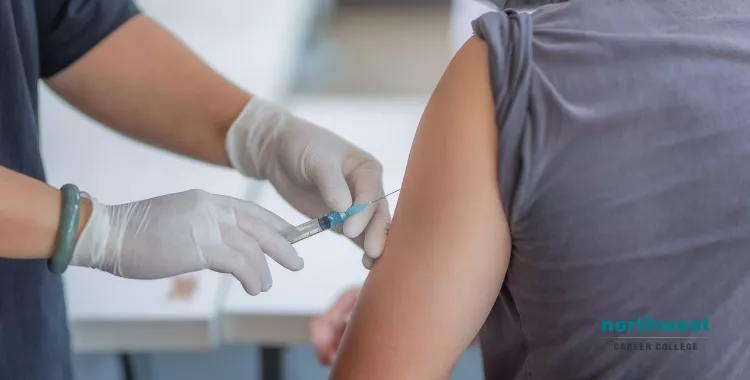How Does Vaccination Work?
- Pharmacy Technician
- March 12, 2024
- 3.2k views
- 4 min read

Vaccination is one of the primary tools in modern medical science’s fight against disease and is responsible for the limitation if not outright eradication of some of the most dangerous and formerly prevalent diseases known to humankind.
In this article, we’ll be looking at how vaccines work, how effective they are, and how safe they are.
Table of Contents
How Does Vaccination Work?
Vaccination works by triggering you body’s immune response to produce specific antibodies. These antibodies are large proteins that act as scouts for your immune system, hunting down an infectious agent, and marking it for destruction by the immune system.
Each set of antibodies produced by your immune system is specific to bacteria or virus it is designed to detect. Specific antibodies will remain in the immune system after the infection has gone and function as a sort of memory for your immune system, reactivating when the specific disease they were created to combat is encountered again.
Vaccines contain a harmless form of the bacteria or virus that causes the disease you are being immunized against. Introducing this disabled version of the bacteria or virus into the body means the immune system produces specific antibodies to combat the disease without any of the risks of actual infection.
The immune system then keeps a memory of the disease, so if a vaccinated person encounters the disease years later, their immune system is ready to fight it off and prevent an infection from developing.
Is Vaccination Effective?
Most childhood vaccines are effective in 85% to 95% of children who receive them and save around 2–3 million lives every year. Widespread vaccination is responsible for the complete eradication of the smallpox virus, which killed around 5 million per year up until as recently as the 1980s.
Vaccination is the reason that children no longer die in large numbers from diphtheria, whooping cough, measles, and polio, and these diseases only occur in rare cases, rather than being leading causes of infant mortality.
Regular vaccination continues to prevent these diseases from again a foothold in the wider population and may eventually lead to them being eradicated altogether, as in the case of smallpox.
Are Vaccines Safe?
All modern vaccines have to go through a rigorous safety checking period before they are allowed to be given to the general public. All vaccines currently in use are continually monitored for safety and effectiveness.
Common myths about vaccines, such as them containing mercury or causing autism are either works of fiction and disinformation or based on utterly and repeatedly debunked pseudoscientific evidence.

Some vaccines do contain aluminum, but the total aluminum content of all childhood vaccines combined is less than the weekly safe intake level prescribed by the FDA.
Certain vaccines may also contain Formaldehyde which, in large doses is poisonous. However, the amount of formaldehyde present in any vaccine is fifty times smaller than that found in a standard supermarket pear.
The real danger when it comes to vaccines is disinformation scaring people away from the idea of having their children vaccinated, leading to a rise in cases of diseases, such as measles, that had formerly been on the edge of being eradicated, and which are directly fatal to both unvaccinated children and adults.
Start Your New Career As A Pharmacy Technician Now!
Northwest Career College is one of the premier pharmacy technician schools in Las Vegas. Our course provides our students with the skills and training they need to take advantage of the growing need for pharmacy technicians.
Our experienced instructors offer online and on-campus classes to accommodate your Las Vegas work and family schedule. Call us today at (702) 403-1592 to speak to one of our enrollment specialists.



